AgrAbility Harvest 2022 An ingathering of helpful information on disability in agriculture
Reunions are popular types of gatherings, and they come in a variety of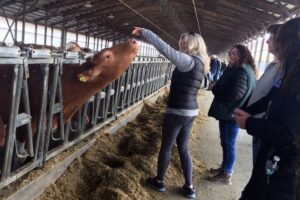 forms: family reunions, class reunions, military reunions, homecomings, and many others. They’re important for reconnecting with friends, making memories, sharing histories, and renewing vision for the future.
forms: family reunions, class reunions, military reunions, homecomings, and many others. They’re important for reconnecting with friends, making memories, sharing histories, and renewing vision for the future.
AgrAbility had an important reunion this past spring. After being canceled for two years due to the pandemic, the National Training Workshop (NTW) was held March 14-17 in Madison, Wisconsin. Organizers thought that, due to lingering pandemic-related issues, 150 people at most might attend; however, nearly 200 participated. The crowd was clearly eager to meet face-to-face again for education, networking, and reenergizing.
In additi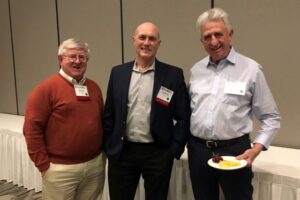 on to the NTW, during the past year National AgrAbility also sponsored regional conferences in Montana, Kansas, Tennessee, and Ohio. The success of these events served to further reinforce the importance of, and appetite for, in-person gatherings.
on to the NTW, during the past year National AgrAbility also sponsored regional conferences in Montana, Kansas, Tennessee, and Ohio. The success of these events served to further reinforce the importance of, and appetite for, in-person gatherings.
As encouraging as reunions are, one often challenging aspect of them is remembering those who are no longer with us. On page 7, you can read about two such people AgrAbility lost from its family during the past year.
A silver lining of the pandemic was increased capacity for virtual connections,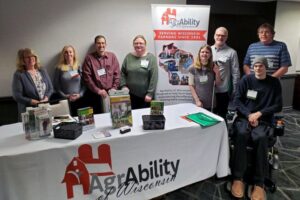 and AgrAbility took advantage of web technologies to expand its outreach through highly successful events like the AgrAbility Virtual State Fair and the 2021 AgrAbility NTW Virtual Sessions. While these helped compensate for the loss of in-person events, AgrAbility thrives on high-touch, personal contacts and relationships that can’t be fully appreciated in an online context.
and AgrAbility took advantage of web technologies to expand its outreach through highly successful events like the AgrAbility Virtual State Fair and the 2021 AgrAbility NTW Virtual Sessions. While these helped compensate for the loss of in-person events, AgrAbility thrives on high-touch, personal contacts and relationships that can’t be fully appreciated in an online context.
If yo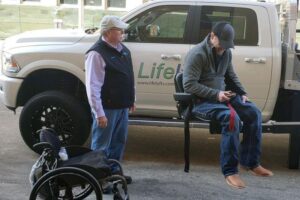 u haven’t experienced an in-person AgrAbility event, or if you have and you can’t wait for the next opportunity, there are plenty of options. See On the Horizon for information on upcoming regional and national AgrAbility workshops.
u haven’t experienced an in-person AgrAbility event, or if you have and you can’t wait for the next opportunity, there are plenty of options. See On the Horizon for information on upcoming regional and national AgrAbility workshops.
Growing Food is His New Mission
When Davon Goodwin transitioned to civilian life, he found a new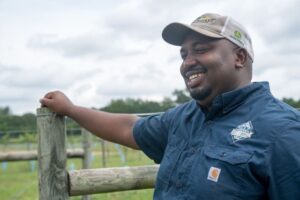 purpose and a supportive community.
purpose and a supportive community.
by Cheryl Tevis
Davon Goodwin never imagined a career in agriculture. The Pittsburgh native enrolled at the University of North Carolina-Pembroke, where he could combine wrestling with studying biology and botany. “I wanted to go on to get my doctorate, do research, and travel the world,” he says.
But his life took a sharp detour in 2010 when he was a 21-year-old Army recruit. “It was a sit-down moment with God,” he says. “He gave me a different mission – greater than I could have imagined.”
Goodwin’s unit was unexpectedly sent to Afghanistan. On August 31, 2010, a bomb exploded beneath the truck he was driving. “That day shook everything,” he says.
Goodwin was transported to a hospital in Landstuhl, Germany, where he drifted in and out of consciousness. He had suffered a traumatic brain injury, as well as damage to the L1 and L2 vertebrae in his lower back. He returned to Ft. Bragg for rehabilitation. “I felt there was no reason to live,” he says. “Along with all of the medication I was taking, I started drinking.”
In 2011, he re-enrolled at the university, where he volunteered with Growing Change, a nonprofit sustainable farm for out-of-school youth. But his struggles to complete his degree led to a diagnosis of narcolepsy. “Graduating was a huge accomplishment, but I still felt an emptiness,” he says.
Finding a Path Forward
In July 2014, Goodwin was awarded a Purple Heart and retired from the Army. A mutual friend introduced him to Dr. Neil Griffin, owner of Fussy Gourmet Farms, a 466-acre farm in Raeford, NC. He was offered a job. “I told him I didn’t know anything about farming or managing a farm, but he said he’d teach me everything I’d need to know, if I’d stick with it,” he says.
By this time, Goodwin and his wife, Kenya, had a young son. “I couldn’t have dreamed up a better job,” he says. “When I put my hands in the dirt, it changed me. It gave me a sense of calmness and set me on the right track.”
But his medication for narcolepsy didn’t always work. “One day, when I was cutting hay, I fell asleep and ran into the fence,” he says.
Goodwin also began feeling isolated on the farm. One day, he left the gate open, and an elderly woman entered. It wasn’t a U-pick farm, but he gave her a bucket. “She needed to talk, and it felt good to be vulnerable with her,” he says. “She said, ‘You have to tell your story. The burden isn’t yours to carry alone. It’s too much weight.’ ”
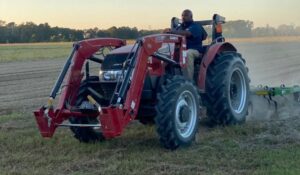 For the first time, he considered starting a U-pick. “I realized I needed help, and my community could help hold me accountable for the person I wanted to be,” he says. At the same time, he was living in a food-insecure county. “Everyone deserves to eat,” he says.
For the first time, he considered starting a U-pick. “I realized I needed help, and my community could help hold me accountable for the person I wanted to be,” he says. At the same time, he was living in a food-insecure county. “Everyone deserves to eat,” he says.
In November 2016, a veteran friend invited him to a Farmer Veteran Coalition conference, where he met Cindy Chastain, veteran outreach coordinator for the National AgrAbility Project (NAP).
“Davon didn’t want to talk about his disabilities at that time,” Chastain says. But she contacted Betty Rodriguez, AgrAbility project manager at NorthCarolina A&T State University. She brought Gloria Jinks of the North Carolina Assistive Technology Program and Jessica Wilburn of the North Carolina AgroMedicine Institute to the farm with her.
North Carolina AgrAbility ordered a wearable device through NAP’s partner, Easterseals UCP North Carolina. “It was overwhelming to have AgrAbility come up with a $20 snooze alert,” 2 he says. “It put confidence back in me.”
After four years as farm manager, Goodwin leased land from Fussy Gourmet to launch Off-the-Land (OTL). He began with five acres of muscadines, a thick-skinned native grape, and invited groups to come in. “The sense of community was awesome,” he says.
But student loans loomed. “I was naive about the cost of land, and as an African-American, I lacked access to capital,” he says. He took a job as executive director of the Sandhills AgInnovation Center in Ellerbe. Rodriguez helped him obtain anti-fatigue mats to reduce his back pain. He farmed evenings and weekends.
It Takes a Community
In 2018, he bought 42 acres near Laurinburg, where he combines U-pick with commercial and retail sales. With the help of one part-time employee, Goodwin harvests about 60-80 pounds per vine.
He also began growing blackberries, leafy greens, beets, turnips, and fennel. Three years ago, he and his wife built a home on the farm to grow their family: a 10-year-old son and two-year-old daughter. He also sells through the SandHills Farm to Table Cooperative in Ellerbe, using the Farmer Veteran Coalition’s “Homegrown by Heroes” label. In 2020, he added caterpillar tunnels.
Goodwin’s conventional farmer neighbors have been helpful. “They understand what it means to be a first-generation farmer, especially someone who grew up in the inner-city,” he says. “It takes a community to raise a farmer.”
He still faces challenges, including sandy soils and an at-risk location for hurricanes. Last year, a late freeze killed his blackberries. “My goal is to meet the community where it’s at and not outprice it,” he says. “That passion fuels me now – making sure people can eat every day.”
Goodwin compares being a farmer to being a soldier. “Farmers work alone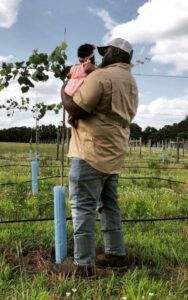 and carry a lot of weight on their shoulders,” he says. He still has migraines, back pain, and other side effects. “I’ll never be the Davon I used to be,” he says. “I’m starting to be OK without chasing that Davon. So much went into the journey that got me where I am now.”
and carry a lot of weight on their shoulders,” he says. He still has migraines, back pain, and other side effects. “I’ll never be the Davon I used to be,” he says. “I’m starting to be OK without chasing that Davon. So much went into the journey that got me where I am now.”
He adds, “There are moments in time, but no moment lasts forever. You take what you can, and move on. I’m not there yet, but I’m on the right road. I don’t think I’d be alive without farming. It’s about a sense of purpose.”
Personal Safety and Health
Working safely is essential for anyone involved in agriculture. However, it is especially important for people with disabilities due to such factors as health vulnerabilities and the risk of secondary injuries. Here are just a few of the many devices to help protect agricultural workers with disabilities.
Cooling Arm Sleeves
Made of soft knit fabric, these are designed to provide cooling relief, absorb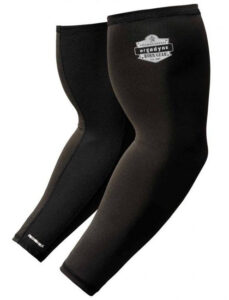 and wick away sweat, shield from the sun’s UV rays, and even protect against minor abrasions. To activate, simply immerse in cold water then gently squeeze prior to slipping them on. To rehydrate, just douse with water while wearing them. agrability.info/sleeves
and wick away sweat, shield from the sun’s UV rays, and even protect against minor abrasions. To activate, simply immerse in cold water then gently squeeze prior to slipping them on. To rehydrate, just douse with water while wearing them. agrability.info/sleeves
ErgoMates Anti-Fatigue Overshoes
This product, which straps on over one’s footwear, is designed to minimize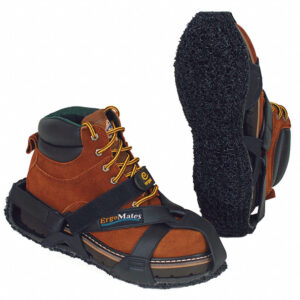 impact shock, pain, and fatigue for those who must stand or walk on hard surfaces for extended periods. The overshoes, available in five sizes, feature flexible, slip-resistant, two-ply soles, self-cleaning tread design, and are reportedly resistant to oil, solvents, and chemical damage. agrability.info/ergomates
impact shock, pain, and fatigue for those who must stand or walk on hard surfaces for extended periods. The overshoes, available in five sizes, feature flexible, slip-resistant, two-ply soles, self-cleaning tread design, and are reportedly resistant to oil, solvents, and chemical damage. agrability.info/ergomates
Personal Air-Quality Monitors
These handheld or wearable battery-powered units track, measure, record,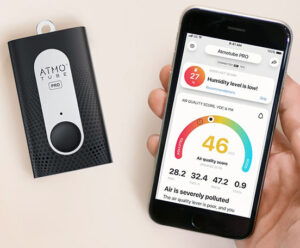 and transmit surrounding atmospheric condition data to one’s electronic device. They warn those with respiratory issues (via audio-alert) when in an environment dangerous to their lungs so that protective action can be taken. Among the pollutants these monitors detect are carbon and nitrogen oxides, vehicle-exhaust emissions, dust, pollen, soot, mold, and gaseous volatile organic compounds. They can also measure atmospheric pressure, temperature, and humidity. agrability.info/air-monitor
and transmit surrounding atmospheric condition data to one’s electronic device. They warn those with respiratory issues (via audio-alert) when in an environment dangerous to their lungs so that protective action can be taken. Among the pollutants these monitors detect are carbon and nitrogen oxides, vehicle-exhaust emissions, dust, pollen, soot, mold, and gaseous volatile organic compounds. They can also measure atmospheric pressure, temperature, and humidity. agrability.info/air-monitor
Heat-Stress Monitor
This instrument is designed to monitor environmental conditions in many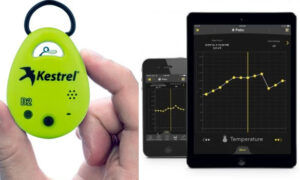 settings where humans (or animals) are active. It records such things as ambient temperature, relative humidity, dew point temperature, heat-stress index, and temperature-humidity index. The collected data are then transferred to one’s iOS or Android device via the Kestrel Link app. The system, which reportedly stores thousands of data points and provides months of logging, allows for the customizing of logging rate, connections, and alerts. agrability.info/heat-monitor
settings where humans (or animals) are active. It records such things as ambient temperature, relative humidity, dew point temperature, heat-stress index, and temperature-humidity index. The collected data are then transferred to one’s iOS or Android device via the Kestrel Link app. The system, which reportedly stores thousands of data points and provides months of logging, allows for the customizing of logging rate, connections, and alerts. agrability.info/heat-monitor
Over-the-Ear Drowsiness Alert
This sensing device is primarily for use when driving but can be used by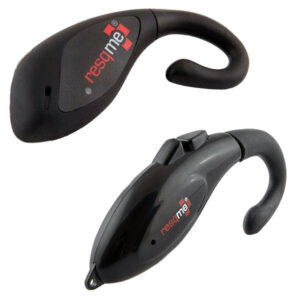 those with sleep disorders like narcolepsy. When turned on, it first sets the angle from perpendicular then monitors for any indication that the head is tipping forward, in which case it sounds an alarm or emits a vibration (depending on type) to alert the individual. agrability.info/drowsiness
those with sleep disorders like narcolepsy. When turned on, it first sets the angle from perpendicular then monitors for any indication that the head is tipping forward, in which case it sounds an alarm or emits a vibration (depending on type) to alert the individual. agrability.info/drowsiness
Above-Ground Storm Shelters
Made either of bolted-together, thick steel plates or of pre-cast, steel- reinforced concrete, these units are designed to resist high winds (even tornadoes), object impact, shifting foundations, flooding, and heavy rains. Most come as components that a crew assembles on-site then anchors to an earlier-laid reinforced foundation slab. The ones listed at this link are disability-accessible. agrability.info/shelters
reinforced concrete, these units are designed to resist high winds (even tornadoes), object impact, shifting foundations, flooding, and heavy rains. Most come as components that a crew assembles on-site then anchors to an earlier-laid reinforced foundation slab. The ones listed at this link are disability-accessible. agrability.info/shelters
* The authors assume no liability in connection with any use of the products discussed and make no warranty (express or implied) in that respect. References to products are not intended as endorsements to the exclusion of others that may be similar.
AgrAbility 30-year summary
Among the highlights are a timeline of the program’s history, descriptions and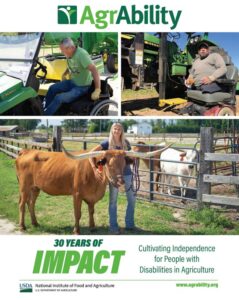 statistics related to AgrAbility’s major initiatives, and 13 client stories (many with video links). The publication focuses on the many ways AgrAbility can improve quality of life and cultivate independence for people with disabilities in agriculture.
statistics related to AgrAbility’s major initiatives, and 13 client stories (many with video links). The publication focuses on the many ways AgrAbility can improve quality of life and cultivate independence for people with disabilities in agriculture.
USDA’s National Institute of Food and Agriculture has supported AgrAbility since its inception. The program is also grateful for its other sponsors, like CHS Foundation, Farmer Veteran Coalition, Farm Credit, NEC Foundation, and ButcherBox, to name just a few.
You can download a PDF copy of the publication and access a screen-reader friendly version at www.agrability.org/impact.
Upgraded agrability.org
The www.agrability.org website recently underwent a major remodeling.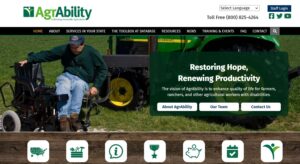 While still containing the valuable resources that were on the previous version, its design has been modernized and its navigation improved. Also included are new features, such as enhanced resources for people who live in states that don’t have AgrAbility projects.
While still containing the valuable resources that were on the previous version, its design has been modernized and its navigation improved. Also included are new features, such as enhanced resources for people who live in states that don’t have AgrAbility projects.
New AgrAbility publication database launched
The AgrAbility Fact Sheet Working Group has been hard at work for more than two years to quantify, classify, and develop new publications. One result is the AgrAbility Publication Database, which provides links to publications produced by AgrAbility projects around the country – not just those from the National Project.
Publications can be filtered by Major Focus (such as assistive technology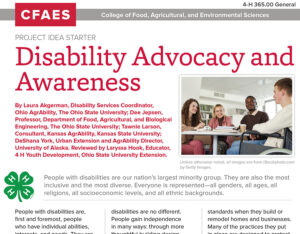 or mental health) and by Target Audience (like veterans or youth). The search function allows one to select as many categories as desired, and search results show all of the publications listed under all the categories chosen. In most cases, users can access the given publication directly through the provided link. However, if a publication is not available electronically, an alternate method of accessing it is noted.
or mental health) and by Target Audience (like veterans or youth). The search function allows one to select as many categories as desired, and search results show all of the publications listed under all the categories chosen. In most cases, users can access the given publication directly through the provided link. However, if a publication is not available electronically, an alternate method of accessing it is noted.
Among the new collaborative publications from AgrAbility Fact Sheet Working Group members are these: Establishing and Using a Support Network for Individuals with Disabilities, Using Checklists to Increase Productivity on the Farm, and a 4-H idea starter/self-directed project titled Disability Advocacy and Awareness.
Access the database at www.agrability.org/fact-sheet.
Osteoarthritis and ag
Osteoarthritis (OA) continues to be one of the most prevalent conditions faced by AgrAbility clients, so the Osteoarthritis Action Alliance (OAAA) remains an important partner on the National AgrAbility Project.
OAAA is developing a variety of resources to assist people in agriculture who suffer from OA. These projects include a web page on OA and agriculture, social media posts on the topic, and an upcoming webinar. The OAAA team is also collaborating with Purdue staff to develop a curriculum for teaching young people about the risks of OA in agriculture. This tool could be used by high school teachers and FFA advisors to help youth understand that preventing OA starts at an early age. Visit oaaction.unc.edu.
Dial 988 for mental/behavioral health crises
The 988 Suicide and Crisis Lifeline was launched nationwide in July 2022 in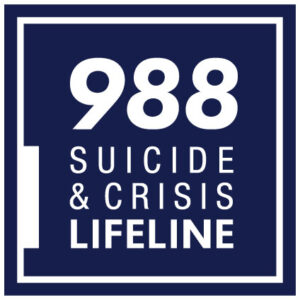 English and Spanish. Those who call (or text) 988 are connected with counselors trained to deal with people in suicidal or emotional distress. Details about all the available service options are available at 988lifeline.org.
English and Spanish. Those who call (or text) 988 are connected with counselors trained to deal with people in suicidal or emotional distress. Details about all the available service options are available at 988lifeline.org.
USDA/National Institute of Food and Agriculture
Brad Rein and AgrAbility have been inseparable for more than 30 years. He was AgrAbility’s first USDA national program leader when it began in 1991, and he maintained his support of the program at the federal level until his retirement from USDA on May 31, 2022.
In his parting email to AgrAbility staff, Brad said, “It has been a great Federal career over the last 32+ years, and having the opportunity to support AgrAbility, work with you, and see how AgrAbility has made a difference in the lives of the public we serve has been so personally rewarding.” He also gave a moving testimony about the importance of the program during his address at the 2022 National Training Workshop.
It’s impossible to gauge the positive impact of Brad’s work on AgrAbility’s outreach and mission. However, it is clear that the program is indebted to him and is very thankful for all his support, guidance, and encouragement over the years.
Continuing to guide USDA’s efforts at the federal level is Victoria (Vicki) Finkenstadt, national program leader in the NIFA Division of Agricultural Systems. Vicki has extensive experience as a research scientist and also leads NIFA efforts in areas such as urban agriculture, biofuels, and sustainable agriculture. She is assisted by Tiffany Woodson, a program specialist with USDA, who works directly with AgrAbility projects on a variety of grant-related issues. Tiffany previously served as a USDA specialist in Virginia.
Farm Rescue
Like AgrAbility, Farm Rescue assists agricultural workers who have incurred some form of loss; however, it takes a unique road to providing assistance. The organization sends its volunteers directly to the farms or ranches of those who have experienced major illness, injury, or natural disaster, along with the necessary equipment to provide free assistance for planting, haying, harvesting, hauling commodities, or feeding livestock.
Bill Gross founded the organization in 2005. After growing up on a
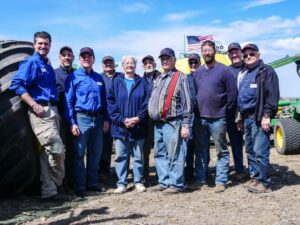
North Dakota farm, he became an airline pilot but never forgot his agricultural roots and the importance of extending a helping hand to others. To date, approximately 1,000 volunteers from 49 states have signed up. Volunteers provide their own transportation to designated assistance sites, but Farm Rescue covers their food, fuel, and lodging.
According to Farm Rescue’s statistics, 97% of the farmers and ranchers they have assisted are still operating three years after receiving their help. In addition, the Farm Rescue Foundation has been able to help with purchases of assistive technology for farmers with disabilities.
Currently, the organization is able to provide assistance in North Dakota, South Dakota, Montana, Minnesota, Iowa, Nebraska, and Kansas, with Illinois to be added in 2023. As Farm Rescue continues to gain supporters, it plans to expand to new states.
For more information, visit www.farmrescue.org.
Changing of the guard
Cindy Chastain, veteran outreach coordinator for the National AgrAbility Project and Indiana AgrAbility, said goodbye to AgrAbility service on July 15. Soon after retiring from a 30+ year career as an Army officer, Cindy met NAP Project Director Bill Field at a 2014 NRCS event where she had shared her experiences as part of an agribusiness development team mission while deployed in Afghanistan.
As a member of the NAP team, Cindy has represented AgrAbility through many avenues, including testifying before the U.S. House Agriculture Committee concerning veterans in agriculture.
As Cindy leaves, Joe Ricker will be helping to provide AgrAbility services to veterans in Indiana and other states. He also spent 30+ years as an Army officer, and he served an internship with National AgrAbility during his last six months of active duty through the Department of Defense SkillBridge program. In addition to his AgrAbility activities, Joe is a beginning farmer and beekeeper.
Thank you, Mike Rosmann
The National AgrAbility Project Advisory Team is a key contributor to the program’s functioning, and Mike Rosmann has been an important member of that team since 2012. He recently decided to step down and focus on family, writing, honoring speaking requests, consulting with governmental agencies and media, and responding to agricultural producers who request assistance.
For those unfamiliar with Mike, he is a fourth-generation farmer as well as a rural clinical psychologist who founded AgriWellness, Inc., and who was one of the main proponents for getting the Farm and Ranch Stress Assistance Network (FRSAN) – which now operates in every U.S. state and territory – into the 2008 Farm Bill.
Jefferson Award winner
Kimber Nicoletti-Martínez, Latino outreach coordinator for National AgrAbility, was recipient of a 2021 National Jefferson Award. Given in a number of different categories, Kimber was the sole national honoree for Outstanding Public Service by an Employee. The Jefferson Awards Foundation is a nonprofit organization that “recognizes, inspires and activates volunteerism and public service in communities, workplaces and schools across America” (Wikipedia).
Pandemic-related losses
AgrAbility lost two irreplaceable champions during the pandemic: Jim Williams and Bill Begley. Those familiar with AgrAbility know that Jim was a long-time member of the Illinois AgrAbility Unlimited team, serving as one of that program’s key ambassadors. However, they may not know that, prior to AgrAbility, he worked for Country Financial over 40 years, focusing his public relations efforts on driving safety, fire safety, and especially agricultural safety. Jim also helped found the International Society for Agriculture Safety and Health (ISASH).
Bill was a tireless, passionate advocate for AgrAbility and for farmers and ranchers with disabilities. As director of sales for Life Essentials, he drove countless miles across the U.S. to share hope and practical solutions with people in need and with professionals who work with them. During his presentations, Bill often told about how his life changed when he first went with his brother to install a lift and felt a new calling to help farmers and ranchers with disabilities get the technologies that would change their lives too
In-person workshop opportunities abound! National AgrAbility has two regional workshops scheduled for this fall plus the National Training Workshop on the books for next spring. Consider participating in the New Mexico regional workshop at the Southwestern Indian Polytechnic Institute (SIPI) in Albuquerque on September 27–28, the Nevada regional workshop in Reno on November 29–December 1, and the National Training Workshop in Spokane, Washington, on March 20–23. Visit agrability.info/training for more information.
2022
September 27-28: New Mexico Regional Workshop IN Albuquerque, NM; agrability.info/training
October 2-7: World Dairy Expo in Madison, WI; www.worlddairyexpo.com
October 10-14: APRIL Annual Conference (Virtual); www.april-rural.org
October 18-20: Sunbelt Ag Expo in Moultrie, GA; www.sunbeltexpo.com
October 26-29: National FFA Convention in Indianapolis, IN; convention.ffa.org
November 29 – December 1: Nevada Regional Workshop in Reno, NV; agrability.info/training
2023
January 10-12: Keystone Farm Show in York, PA; leetradeshows.com/keystone-farm-show
February 14-16: World Ag Expo in Tulare, CA; www.worldagexpo.com
February 15-18: National Farm Machinery Show in Louisville, KY; farmmachineryshow.org
March 20-23: AgrAbility National Training Workshop in Spokane, WA; agrability.info/training